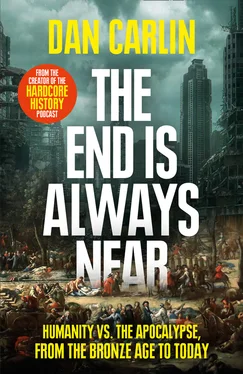Sometime around 1237 BCE, the Hittites were defeated by the Assyrians at the Battle of Nihriya. The resulting loss of territory meant ceding important resource outlets to the Assyrians.[46] There’s a sort of death spiral that can be created in war when a state’s treasury is drained by extended conflict, when manpower is decimated by battlefield defeats, and when possession of the resources that are indispensable for recovering from those losses is lost to the enemy. The year 1237 is right around the start of the traditional era when the Bronze Age seemingly began to come under severe strain, so if we are trying to correlate dates with ripple effects, we can see that the extension of Assyrian power corresponds with some of the large geopolitical changes quite well.
War can be a net positive or negative to a combatant power.[47] War (and the resulting conquests) has often benefited the state doing the conquering. In this case, it might have benefited Assyria.
And while it goes without saying that wars are bad for those who lose them, in many circumstances, wars can be a negative for all involved. By the last year of the First World War, for example, all the nations that had begun the war four years before had been ground down by it. The economies that were paying for the costs of the conflict were in shambles. The damage the war caused to the global system meant that the conflict was harmful even to nations that were not a part of the fight.[48]
The subsequent negative effects of that early twentieth-century war involved many of the same factors we’ve targeted in our discussion of the end of the Bronze Age. By 1918, due to the conflict, Europe was experiencing famine and pestilence to go along with its war and death. The Four Horsemen of the Apocalypse were running rampant through some of the most advanced societies in the early twentieth century—an eventuality that was made possible only because the war opened the door to it. It’s not hard to imagine, then, how a multigenerational and eventually losing struggle with another great power may have challenged the Hittite state.
Assyria’s wars of expansion during this era were in the military history foreground and are hard to miss. But in the background were lots of conflicts that didn’t involve the great powers fighting their peers at all (which doesn’t mean they weren’t potentially important, or possibly fatal, should a great power have been defeated). Lots of “barbarian” peoples and tribes, for example, nibbled at the fringes of the great states, always seemingly ready to exploit weakness or take advantage of opportunities. In the case of the Hittites, their local troublesome “barbarians” were people like the Phrygians and a lesser-known people known as the Kaska (or Gasga). The Kaska are portrayed by the Hittite sources as aggressive wild tribesmen who had sacked and burned the Hittite capital in the past. Some historians think that, as the Hittite state got weaker, its ability to resist these peoples declined. If major conflicts with other powerful states like Assyria weakened the Hittites, it may have made them less able to fend off their traditional “barbarian” neighbors. And, just to tie it all together, if those barbarian neighbors were starving due to a famine caused by arid conditions and poor harvests, does that explain why the Hittites might have had to fend them off in the first place?
If one credits the Assyrians with a large amount of responsibility for bringing down the state of Mittani,[49] and then possibly mortally wounding the Hittites, that would amount to a great deal of political and military change occurring around the thirteenth century BCE. And this might have been enough to spark a chain reaction that disrupted a whole system.
Suspects #6 and #7: Systems Collapse, Multiple Causes
We live in a world of complex systems—economic, cultural, social, administrative-bureaucratic. Many things must function together to make an interconnected system work, and a breakdown anywhere can mean a breakdown everywhere. For that reason, most systems have some flexibility and redundancy built into them to deal with stresses, breakdowns, and unforeseen circumstances—in short, they are made to be resilient. But when these backup systems become overwhelmed, the cascading nature of a problem can ripple throughout the entire system like an economic version of a communicable disease. So in a Bronze Age trading network that reached from Spain to Iran and from northern Italy to Nubia, a disruption of something like Mediterranean commerce could affect all those regions.
And while the loss of things like luxury products and the money generated from trading activity would have had an enormous effect, it’s important to remember that food constituted one of the major categories of goods being shipped in the late Bronze Age. The Egyptians were sending food to multiple places (including the Hittite lands) via ship to alleviate starvation. If those ships were unable to reach their destinations, it wasn’t a question of loss of income or a lowering of living standards, it was a potential famine.
When people don’t have food, under certain circumstances all law and order and societal controls can break down. Plagues can cause the same problems if they’re bad enough. Anarchy, revolution, and civil war can sometimes do to a society what outside invaders can’t manage. All it can take is too little food or too much disease.
There are other scenarios that can lead to the same outcome. Mass migration in a short time (for example, the Libyan and sea peoples’ “invasions” of Egypt) can disrupt norms and break down culture and amicable coexistence. Insufficient military defense can leave a population and its food supplies open to predation by other armed groups.
Some experts have suggested that the Bronze Age system was somewhat fragile or brittle. Undergirded by highly centralized, very bureaucratic states, with a small rich elite presiding over large numbers of peons,[50] such a system might have been vulnerable to all sorts of rebellion and social upheaval. Think of an ancient version of the French Revolution, for example. If such destabilization were sparked by a system’s inability to deliver food to a starving population, what’s ultimately to blame: The famine, or the brittle, inequitable social system? If the sea peoples’ piracy helped destroy the maritime trading system, does the damage come from the piracy or the resulting collapse of the trading system? This is where the multiple-causes suspect begins to look like a good bet.
WHILE WE FEEL somewhat safer from those Bronze Age suspects than our ancestors did, we have managed to add new potential threats that previous eras never had to face: nuclear weapons, global environmental damage, potentially catastrophic scientific innovations, and more.[51] And the ongoing threat of certain types of potentially dark age–inducing wild cards seems pretty consistent over the ages. Whether you live in an era when a scary-size asteroid hits the earth or a supervolcano explodes in Yosemite seems merely the luck of the celestial roulette wheel.
When the Soviet Union suffered a political system collapse[52] in the early 1990s, did some of the USSR’s successor states have something we might consider a mini–dark age? That unsettled era saw an extended and difficult transition period. In newly created nation-states like Russia, birth rates and life expectancy dropped drastically. Alcoholism and suicide rates rose; the social safety net was shredded; the nation’s military and infrastructure seemed to atrophy; its political system seemed unsteady, corrupt, and chaotic; and its national resources were seemingly up for grabs to the highest or most corrupt bidder. If the history of the post-USSR era were being written by historians a century ago, would they have called it “The Decline and Fall of the Soviet Union”? Would they have identified the period afterward as a “dark age”?
Читать дальше











